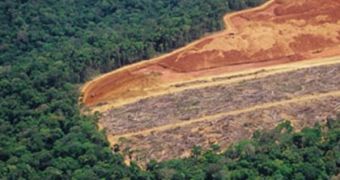The Rights and Resource Initiative warns that by 2030 yet another massive chunk of the tropical rainforest will be gone in favor of agriculture as the demand for food and biofuels increases. The organization also points out that the governments of developing countries are rather reluctant in applying any reforms at all regarding land ownership or governance.
"Arguably, we are on the verge of a last great global land grab. It will mean more deforestation, more conflict, more carbon emissions, more climate change and less prosperity for everyone," said RRI's Andy White, co-author of the report.
Researchers argue that the total amount of surface area required in order to keep pace with the rising demands would be roughly 515 million hectares, out of which less than 40 percent are currently available. Furthermore, by 2050 the total surface area destined for agricultural purposes will amount to about three billion hectares, most of which will be used to supply developing countries with food. A UN report shows that currently about 1.4 billion hectares of arable land and another 3.4 billion hectares of pasture are available worldwide.
Other researchers argue that the tendency towards increasing arable land can be combated with genetic engineered crops, although not many agree with this solution and the population is generally reluctant to eating genetically altered products.
To make matters worse, climate change is now starting to affect the productivity of the crops, which could lead to a more accentuated rate in the expansion of arable land by cutting down the rainforest, further worsening the effects of global warming. Estimations place the contribution of forest loss to about 20 percent of the total amount of greenhouse gases emitted worldwide, albeit the process of deforestation cannot be stopped unless the governments of said countries settle once and for all the problem regarding land ownership.
"These new studies should strengthen global resolve to protect the property rights of indigenous and local communities who play a vital role in protecting one [of] the most outstanding natural wonders of the world," said Gareth Thomas of the UK Department for International Development.
"It is clear that the dual crises of fuel and food are attracting significant new investments and great land speculation. Only by protecting the rights of the people who live in and around the world's most vulnerable forests can we prevent the devastation these forces will wreak on the poor," said Andy White while relating to the fact that the UK Department for International Development is involved in programs in Africa destined to help people acquire arable land instead of cutting the rainforest.
Also, the RRI report reveals that only Brazil, Cameroon and Tanzania have active programs attacking the problem of ownership, while other countries have yet to make any progress.

 14 DAY TRIAL //
14 DAY TRIAL //